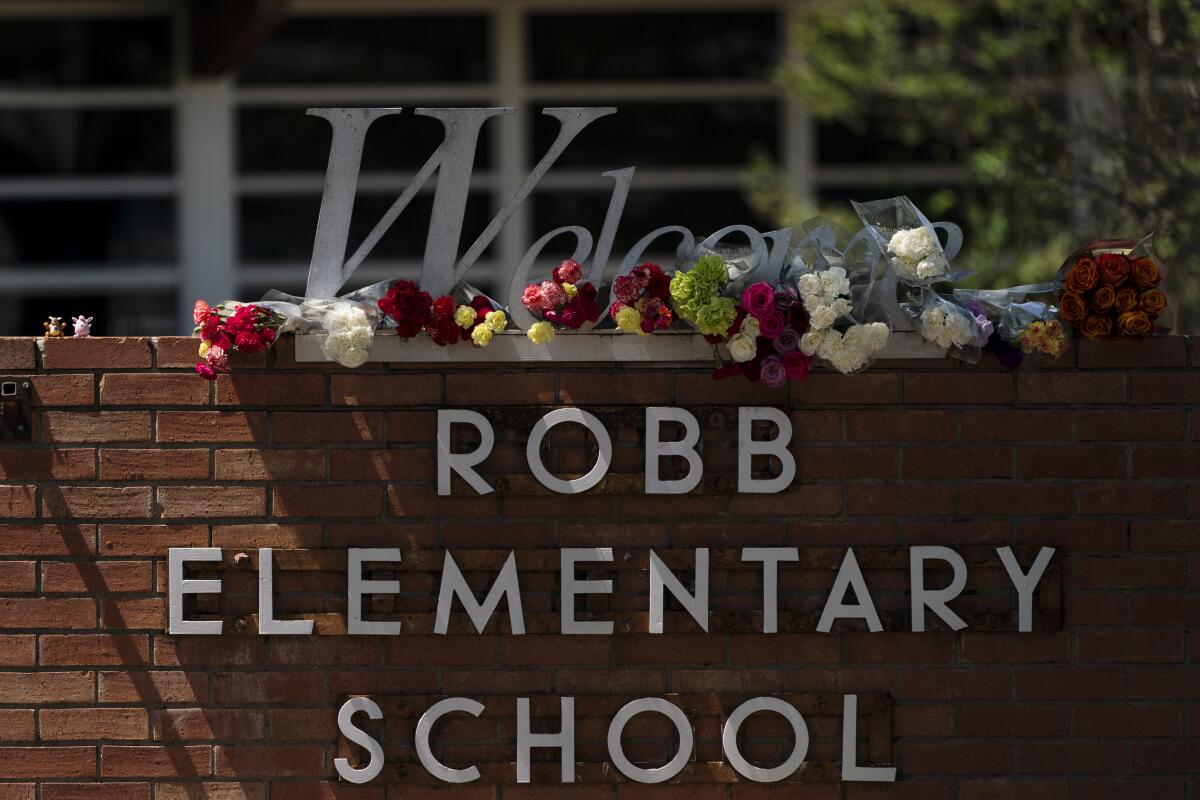Essential California Week in Review: California vs. Texas on the issue of gun control

Good morning, and welcome to the Essential California newsletter. It is Saturday, May 28.
Start your day right
Sign up for Essential California for news, features and recommendations from the L.A. Times and beyond in your inbox six days a week.
You may occasionally receive promotional content from the Los Angeles Times.
Here’s a look at the top stories of the last week
Foes of gun control quickly said after Tuesday’s school shooting in Texas that gun legislation wouldn’t stop such tragedies. But a Times analysis says gun control seems to work. In 2005, California had almost the same rate of deaths from guns as Florida or Texas. Since then, California repeatedly has tightened its gun laws, while Florida and Texas have moved in the opposite direction. California’s rate of gun deaths has declined by 10% since 2005, even as the national rate has climbed in recent years. And Texas and Florida? Their rates of gun deaths have climbed 28% and 37%, respectively.
The mass shooting prompted questions among parents about school security measures that could prevent similar violence on their children’s campuses. The Times’ Howard Blume spoke to L.A.-area school officials, who tried to be reassuring — explaining how they work to keep children safe. But they could not make ironclad pledges. “After these type of incidents, anxiety increases and everyone wants a police officer at a school,” said Gudiel Crosthwaite, superintendent of the Lynwood Unified School District, “but that alone will not solve nor stop these incidents.”
The number of coronavirus cases in California has worsened significantly. The level of cases raised concerns about the possibility of a big jump in infections this summer. The number of California counties in the Centers for Disease Control and Infection’s medium COVID-19 community level doubled on Thursday. Meanwhile, UCLA reinstated an indoor mask mandate on campus.
Gov. Gavin Newsom met with leaders of the state’s largest urban water suppliers Monday and implored them to step up efforts to get people to reduce water use. Amid California’s worsening drought, he warned that the state could be forced to impose mandatory water restrictions if conservation efforts didn’t improve this summer. Here’s a bulleted list that breaks down what you need to know. The message was clear, however, that it’s fine for lawns to go brown, but we need to keep trees alive and healthy.
In related news, Southern California is facing a hot, dry summer in its third year of drought. After a wet December, California had the driest January, February and March on record. The state kicked off the 2021-22 water year with an exceptional atmospheric river on Oct. 28 but ended with below-normal atmospheric river activity for a third straight water year. The U.S. Drought Monitor says extreme drought continues to expand. A timeline of the percentage of California subject to drought since 2000 illustrates the long view that the state has been locked in drought, with a few intermittent wet years, for more than two decades. (Includes informative graphics.)
California lawmakers took on Texas by blocking “heartbeat” abortion laws. A proposal that cleared the Assembly on Monday would guard against such laws and abortion restrictions imposed by other states, reinforcing the state’s pro-abortion-rights status amid uncertainty over abortion services allowed by the landmark ruling in Roe vs. Wade.
San Francisco police said they would not march in this year’s Pride Parade. The decision came after parade organizers said they could not participate in uniform. Organizers said the uniforms could make people feel unsafe. Mayor London Breed also said she’d skip the parade in response to the policy.
Free online games
Get our free daily crossword puzzle, sudoku, word search and arcade games in our game center at latimes.com/games.
The Anaheim City Council voted unanimously to halt the sale of Angel Stadium. In the process, the city was bracing for what council members said could be a long and nasty legal battle with Angels owner Arte Moreno. The move came the day after Mayor Harry Sidhu resigned amid an FBI investigation into the so-called cabal that runs the city. Councilman Jose Moreno said the probe had raised the curtain on what he called “a pandemic of corruption” in Anaheim and called the stadium deal “the fruit of a poisoned tree.”
Four high-ranking men at CSU campuses were accused of sexual harassment. All were treated differently. The Times combed through reports and records and interviewed experts and school officials and found inconsistencies in how California State University investigated and resolved sexual harassment complaints across its 23 campuses. In the two cases in which misconduct was “severe, persistent or pervasive,” one university, which previously provided its administrator with executive coaching before any investigation, allowed him to retire with a lucrative payout and letter of recommendation; the other allowed its administrator to resign with a negotiated payout and paid time off before his leaving.
99% of L.A. asylum seekers in a Biden program — many of them children — face deportation, a report says. The “dedicated docket” has a fast-track timeline that has created additional obstacles, ultimately leading to higher rates of deportation orders, sometimes based on legal technicalities.
Racial disparities have persisted at California’s regional centers for disabled kids, a report says. There are continued racial and ethnic gaps in spending on services for California children and teens with developmental disabilities, despite California investing tens of millions of dollars to address such disparities. During the budget year that ended in June, Latino youth ages 3 to 21 who received services were getting 80% of the spending levels for white youth of the same ages who received services, the report found.
What have the DMV’s investigations around Tesla’s Full Self-Driving turned up? The DMV won’t say. When might the results be public? The DMV won’t say. Why is it taking so long? The DMV won’t say. For the last year, The Times has sought an interview with DMV head Steve Gordon, but his media relations team has declined each time. Gordon has declined similar requests from other media outlets as well. The Times asked to speak with Newsom or his designate about why his administration won’t discuss the matter. The governor’s staff directed the question to the DMV. Meantime, the crashes continue, writes The Times’ Russ Mitchell.
Enjoying this newsletter?
Your support helps us deliver the news that matters most. Become a Times subscriber.
ICYMI, here are this week’s great reads
Once upon a time — before P-22, before Grumpy Cat and Doug the Pug — people gathered by the hundreds just to catch a glimpse of Reggie the Alligator. What Reggie makes of his unusual life story is a mystery. An alligator brain is the size of a peanut. He was once a pet in a San Pedro home (yes, that’s illegal) until his owners realized, “This is an alligator.” A 10-year-old American alligator can be 6 feet long and strong enough to bite through bone. The Times’ Corinne Purtill, with photos by Irfan Khan, looks back at Reggie’s tenure in then-polluted Lake Machado, where visitors created “a circus-like atmosphere,” the multiple attempts to pin him down, and his eventual happy-ever-after.
“Holy crap.” Residents in rural California, which includes some of the state’s most economically distressed areas, are reeling from the high price of gasoline. This week, the five counties in California with the priciest fuel were all in its rural north: Mono, Humboldt, Del Norte, Trinity and Napa. The cost of gas in some of these areas has pushed over $7 a gallon. “We’re hoping to get some relief,” said Mono County Supervisor Bob Gardner, whose constituents regularly commute 60 to 120 miles roundtrip to work, in part because of a major housing shortage.
Today’s week-in-review newsletter was curated by Laura Blasey. Please let us know what we can do to make this newsletter more useful to you. Send comments, complaints and ideas to essentialcalifornia@latimes.com.
Our daily news podcast
If you’re a fan of this newsletter, you’ll love our daily podcast “The Times,” hosted every weekday by columnist Gustavo Arellano, along with reporters from across our newsroom. Go beyond the headlines. Download and listen on our App, subscribe on Apple Podcasts and follow on Spotify.
Start your day right
Sign up for Essential California for news, features and recommendations from the L.A. Times and beyond in your inbox six days a week.
You may occasionally receive promotional content from the Los Angeles Times.




